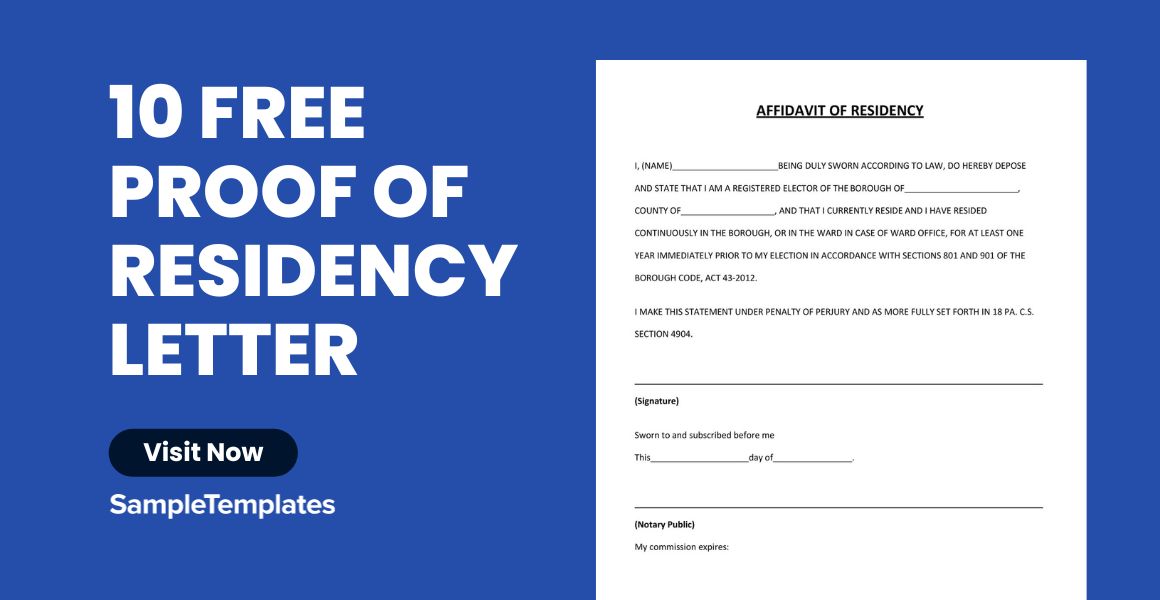Mastering the art of residency verification is effortless with our Sample Proof Of Residency Letter Template. This indispensable tool is perfect for a variety of contexts, from securing housing to fulfilling legal obligations. Our template is meticulously crafted to showcase your residential status with precision and professionalism. It simplifies the documentation process, offering a clear, structured, and comprehensive format. Ideal for individuals in any situation requiring proof of address, this letter template ensures your residency is validated effectively, paving the way for a hassle-free verification experience. Whether you’re a renter, property owner, or student, this template is designed to meet your specific needs with ease and confidence.
1. Sample Landlord Proof of Residency Letter
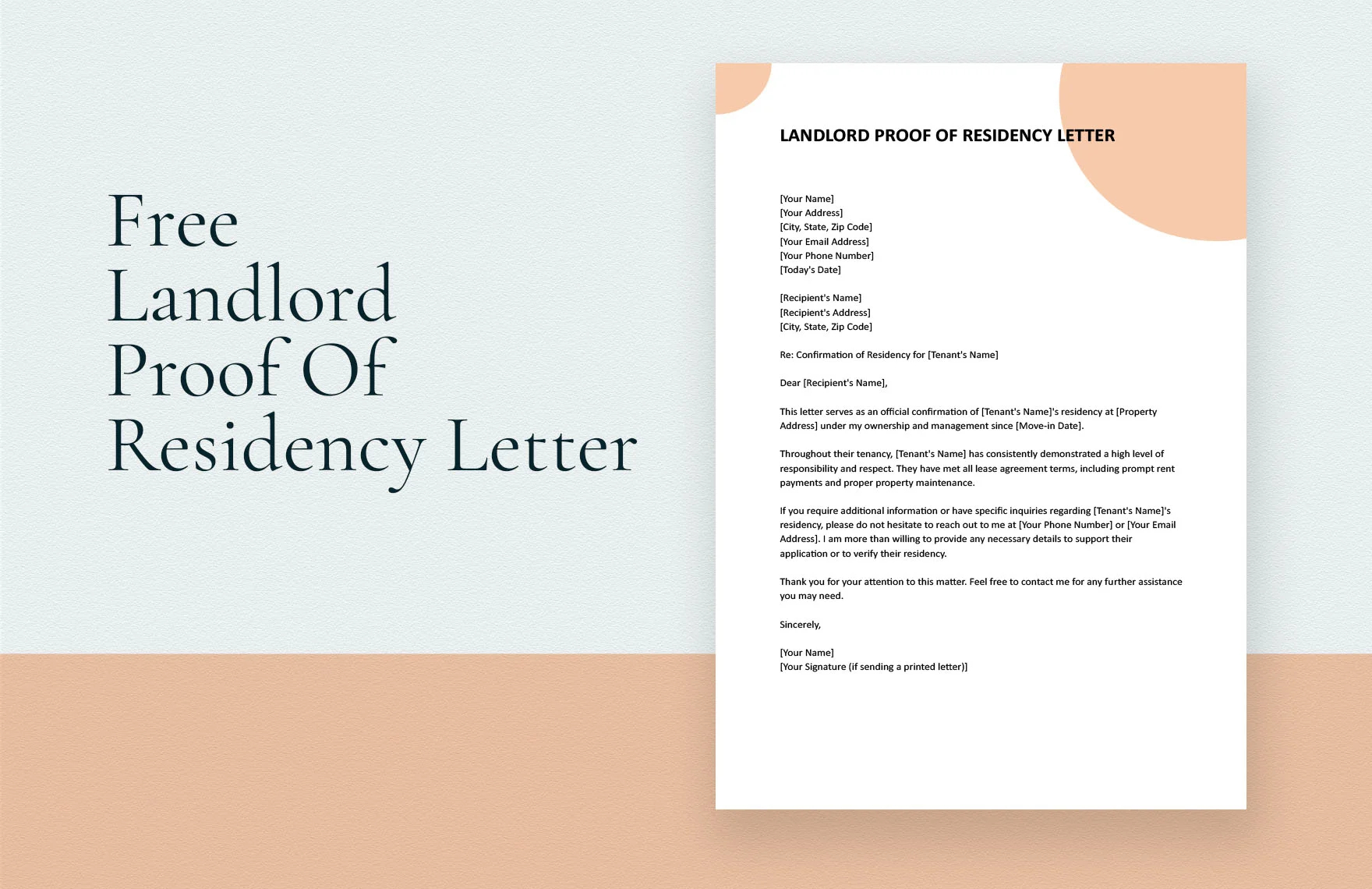
2. Sample Affidavit of Residence Template
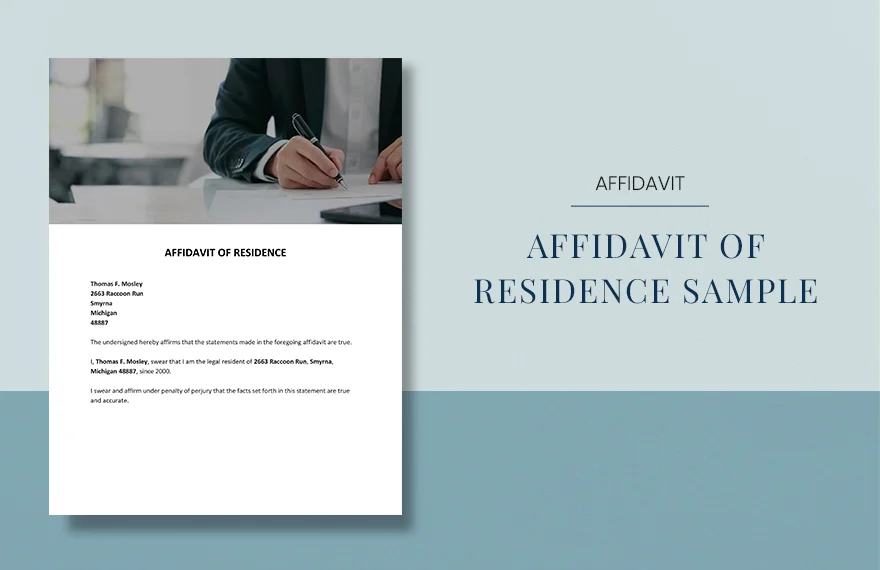
What is a Proof of Residency?
Proof of Residency is an official document or a set of documents used to verify a person’s residential address. This form of verification is crucial in various legal, financial, and administrative scenarios. The document essentially confirms that an individual lives at a specific location, playing a key role in numerous processes from government services to personal banking.
Key Components of a Proof of Residency Document
A typical Proof of Residency document contains essential information including the individual’s full name, current address, and the date of issuance. Some documents might also detail the duration of residence at the address. Clarity, accuracy, and up-to-date information are critical for these documents to be considered valid.
Types of Acceptable Proof of Residency Documents
Various documents can serve as Proof of Residency. These include utility bills (like water, gas, or electricity bills), lease or rental agreements, mortgage statements, property tax receipts, and bank statements. Government-issued IDs (driver’s license, voter registration card) with the current address are also widely accepted. The document selected must be recent, ideally within a few months old, to ensure current residency.
Importance of Proof of Residency in Different Contexts
Proof of Residency is vital for enrolling in schools, obtaining local government services, registering for voting, and applying for a driver’s license or state-specific programs. It is a standard requirement in many routine procedures and is often the first step in establishing legal residency in a new area.
Legal and Administrative Uses of Proof of Residency
In legal terms, Proof of Residency can determine jurisdiction, be essential in court proceedings, and is often required in immigration matters. Administratively, it’s used to establish eligibility for local benefits, school district enrollments, and other location-based services.
Guidelines for Valid Proof of Residency
The guidelines for what constitutes valid Proof of Residency can vary by institution and purpose. Generally, the document should be official, bear the name and address of the individual, and be recent. Some organizations may have specific requirements regarding the type of document accepted.
Common Scenarios Requiring Proof of Residency
Common scenarios requiring this proof include school registrations, applying for local government benefits, updating legal documents after moving, and establishing new financial accounts. Each situation may have unique requirements regarding the type of Proof of Residency needed.
Conclusion: The Role of Proof of Residency in Daily Life
In conclusion, Proof of Residency is a fundamental component in validating an individual’s living situation. Its relevance extends across various spheres, making it an indispensable part of personal and legal identification and verification processes.
3. Tenant Affidavit of Residency Template
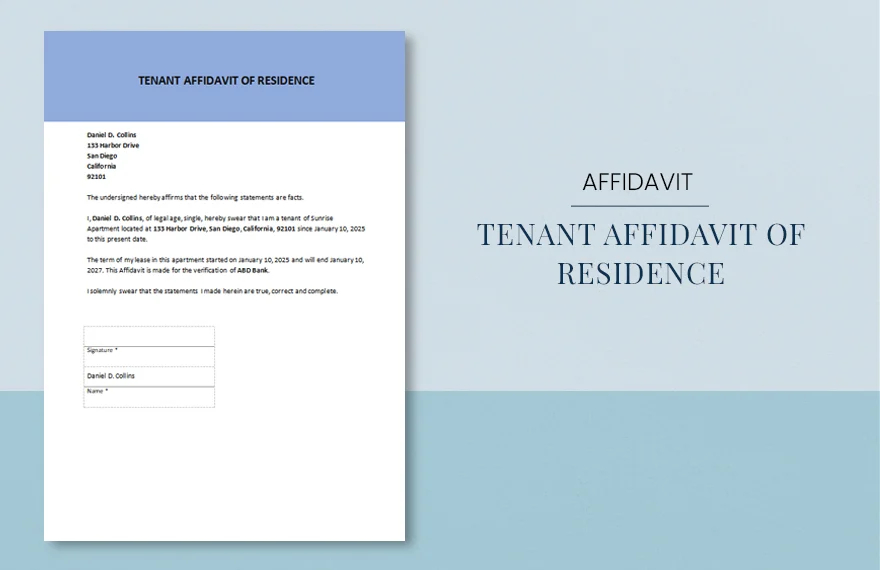
4. Landlord Affidavit of Residency Template
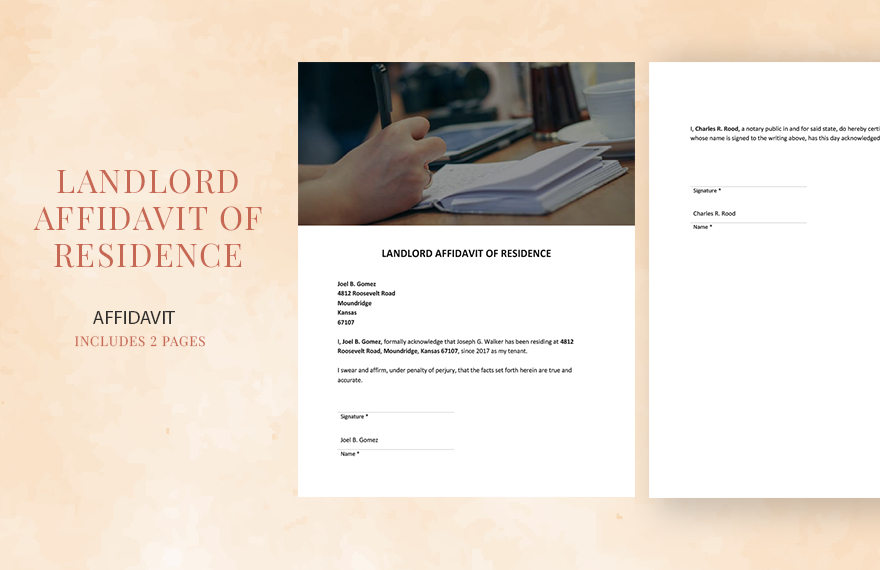
Steps to Take When Writing a Proof of Residency Letter
Before writing a Proof of Residency letter, it’s essential to understand its purpose. This letter is used to verify your current living address. It’s commonly requested by government bodies, financial institutions, schools, or landlords. Each entity may have specific requirements for what they consider valid, so it’s crucial to know these details in advance.
Gathering Necessary Information
Collect all the relevant personal information you’ll need to include in the letter. This typically includes your full legal name, current address, and the length of time you’ve lived at this address. If you’re writing the letter for someone else, like a tenant or family member, ensure you have their accurate details.
Choosing the Right Format
A Proof of Residency letter should be formally structured. Use a standard business letter format, starting with your name and contact information, followed by the date, and then the recipient’s name and address. If you don’t have a specific recipient, “To Whom It May Concern” is a suitable alternative.
Writing the Letter Content
Introduction: Start with a clear statement of purpose. For example, I am writing to verify my residency at [your address].
Body: Provide the necessary details, such as the start date of your residency at the current address. If applicable, mention any additional proof you’re attaching, like a utility bill or lease agreement.
Closing: Offer to provide further information if needed and thank the reader for considering your letter. Include your signature and printed name.
Attaching Supporting Documents
Supplement your letter with additional proof of residency. This might be a copy of your lease or rental agreement, a recent utility bill, bank statement, or any other document that shows your name and address. Ensure these documents are current and valid.
Proofreading and Finalizing the Letter
Carefully review the letter for any errors in spelling, grammar, or factual information. A well-written, error-free letter enhances its credibility. If possible, have someone else read it over as well.
Sending the Letter
Once finalized, send the letter to the appropriate party. If sending by mail, consider using certified mail for an added layer of security and confirmation of delivery. If it’s being submitted electronically, ensure it’s in a commonly accepted format like PDF.
Maintaining a Copy
Always keep a copy of the letter and any accompanying documents for your records. This can be important if there are any follow-up questions or issues.
Following Up
If you haven’t received a response or acknowledgment within a reasonable time frame, follow up with the recipient. This ensures your letter was received and is being processed.
Writing a Proof of Residency letter is a straightforward process when you understand the requirements and steps involved. By providing clear, accurate information in a formal format, and backing it up with appropriate documentation, you can effectively fulfill the need for verifying your residency.
5. Sample Affidavit for Proof of Residency Template
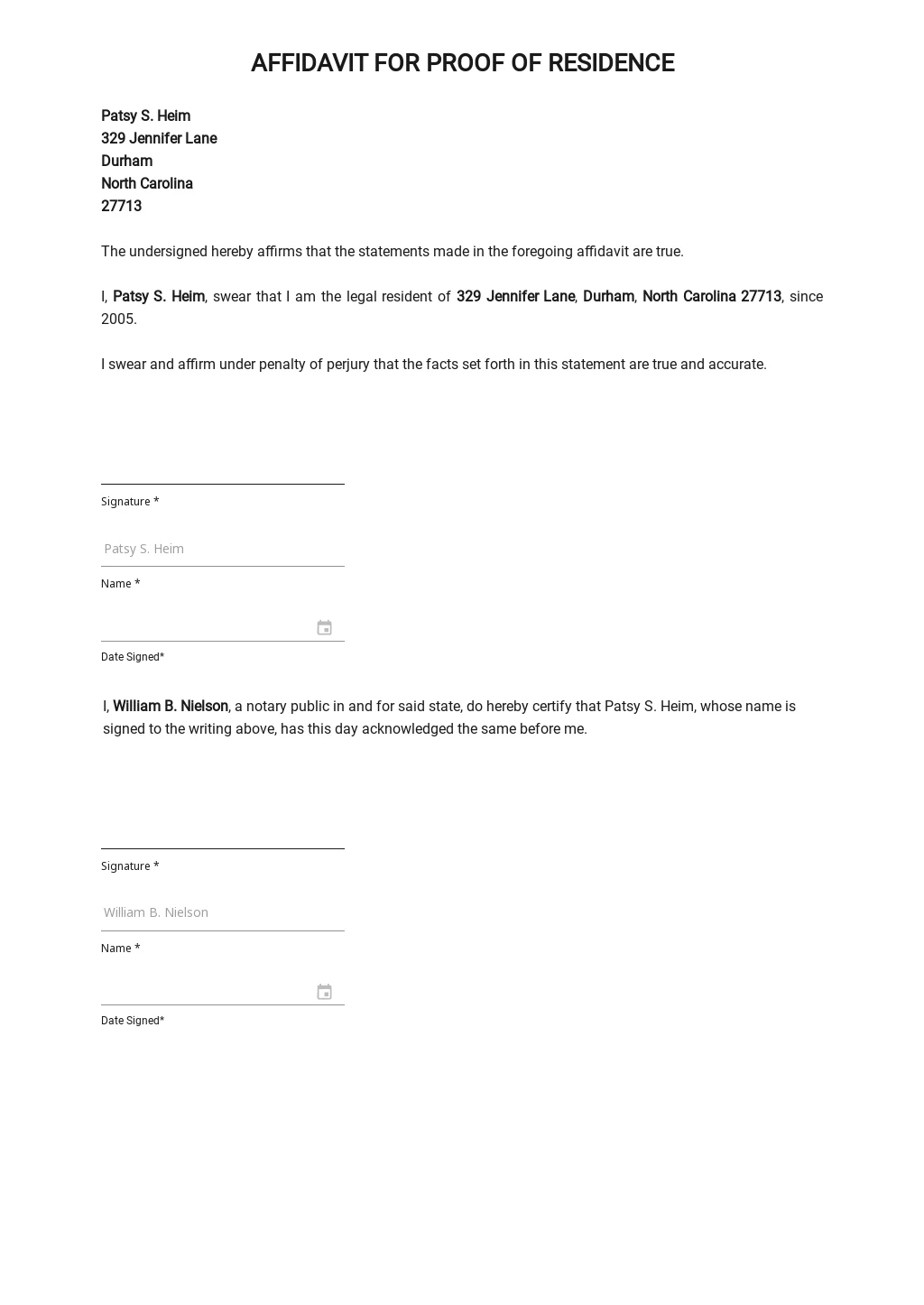
6. Notarized Letter of Residency Template
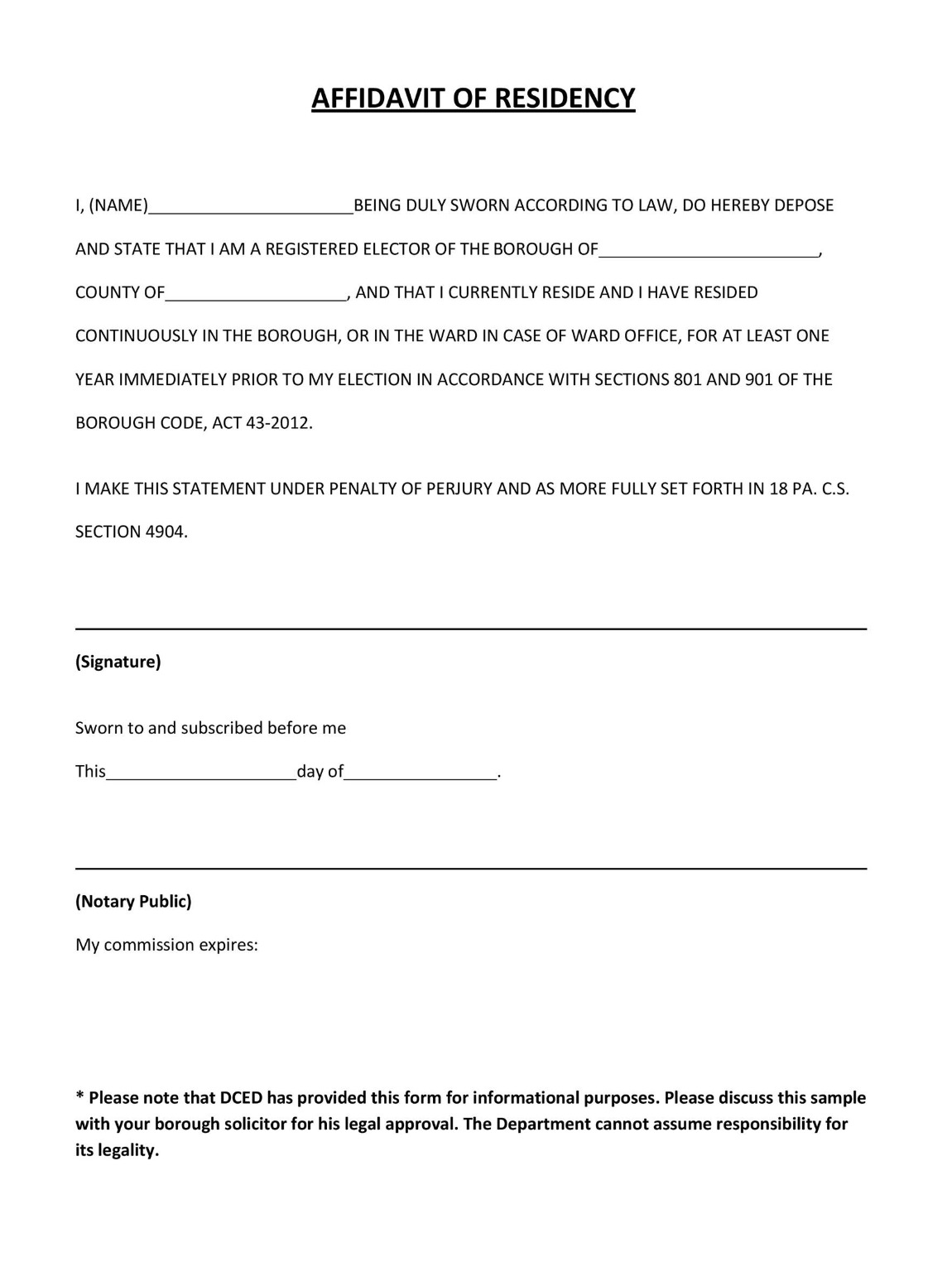
7. Proof of Residency Letter Sample
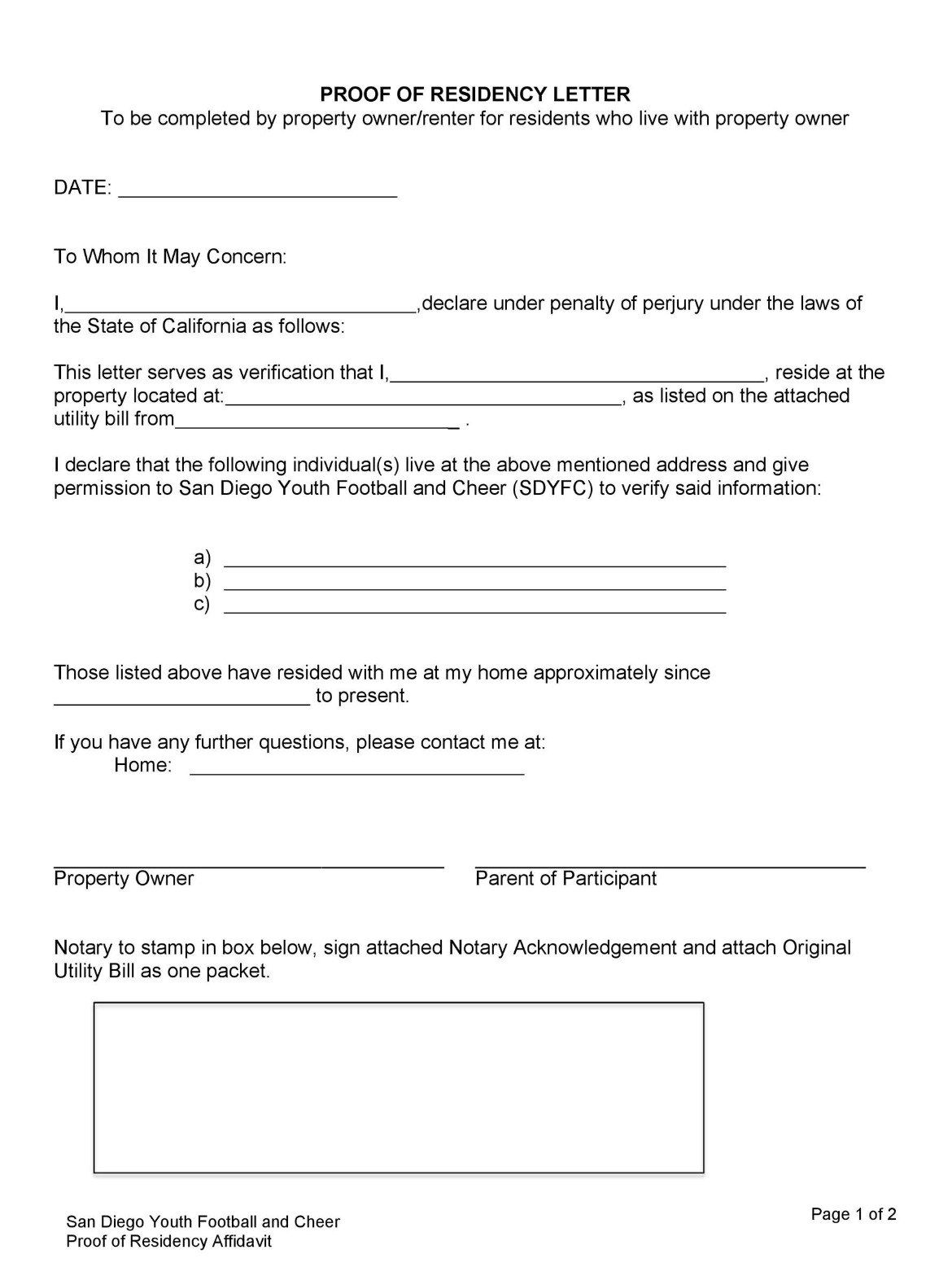
When a Proof of Residency Letter is Needed
A Proof of Residency letter is a vital document used to verify an individual’s residential address in various situations. This letter’s importance is vast, as it touches upon several aspects of both personal and official life.
In Government-Related Services
For voter registration, individuals often need to verify their residence within the voting district. Similarly, applying for or renewing government documents like driver’s licenses or passports requires proof of current residence. Additionally, accessing government benefits, such as social security or welfare programs, often hinges on residency within a specific area.
Educational Institutions Requirements
In the context of education, proof of residency becomes essential. Parents or guardians must provide this proof to enroll their children in public schools. Universities also sometimes require proof of residency for in-state tuition purposes.
Financial and Banking Scenarios
Opening a new bank account often includes submitting proof of residency as part of Know Your Customer (KYC) regulations. Loan applications, especially for mortgages, also necessitate this proof to confirm the applicant’s address.
Real Estate and Housing Implications
The real estate sector frequently requires proof of residency. Landlords often ask for this letter from prospective tenants, and during the home buying process, various legal and financial verifications may necessitate proof of current residency.
Legal Documentation and Proceedings
In legal contexts, proof of residency can play a crucial role, especially in domicile-related disputes. It is also required in processes like legal name changes, where confirming identity and address is imperative.
Employment-Related Uses
Some employers ask for proof of residency for employment eligibility, particularly in government or sensitive positions. It’s also necessary for administering work-related benefits that are location-specific.
Insurance Procedures
For applications across different types of insurance, including health, car, or home insurance, companies require proof of residency to determine rates and coverage eligibility.
Travel and Immigration
In immigration cases, proving residency is crucial for various applications and status adjustments. Even for international travel, visa applications often demand proof of residency in the home country.
The requirement for a Proof of Residency letter is widespread, underlining its significance in daily life. From fulfilling government service prerequisites to education, financial matters, and legal requirements, this document is integral in confirming an individual’s residence. Recognizing when it is needed simplifies numerous processes and ensures adherence to necessary protocols.
8. Sample Proof of Residency Form
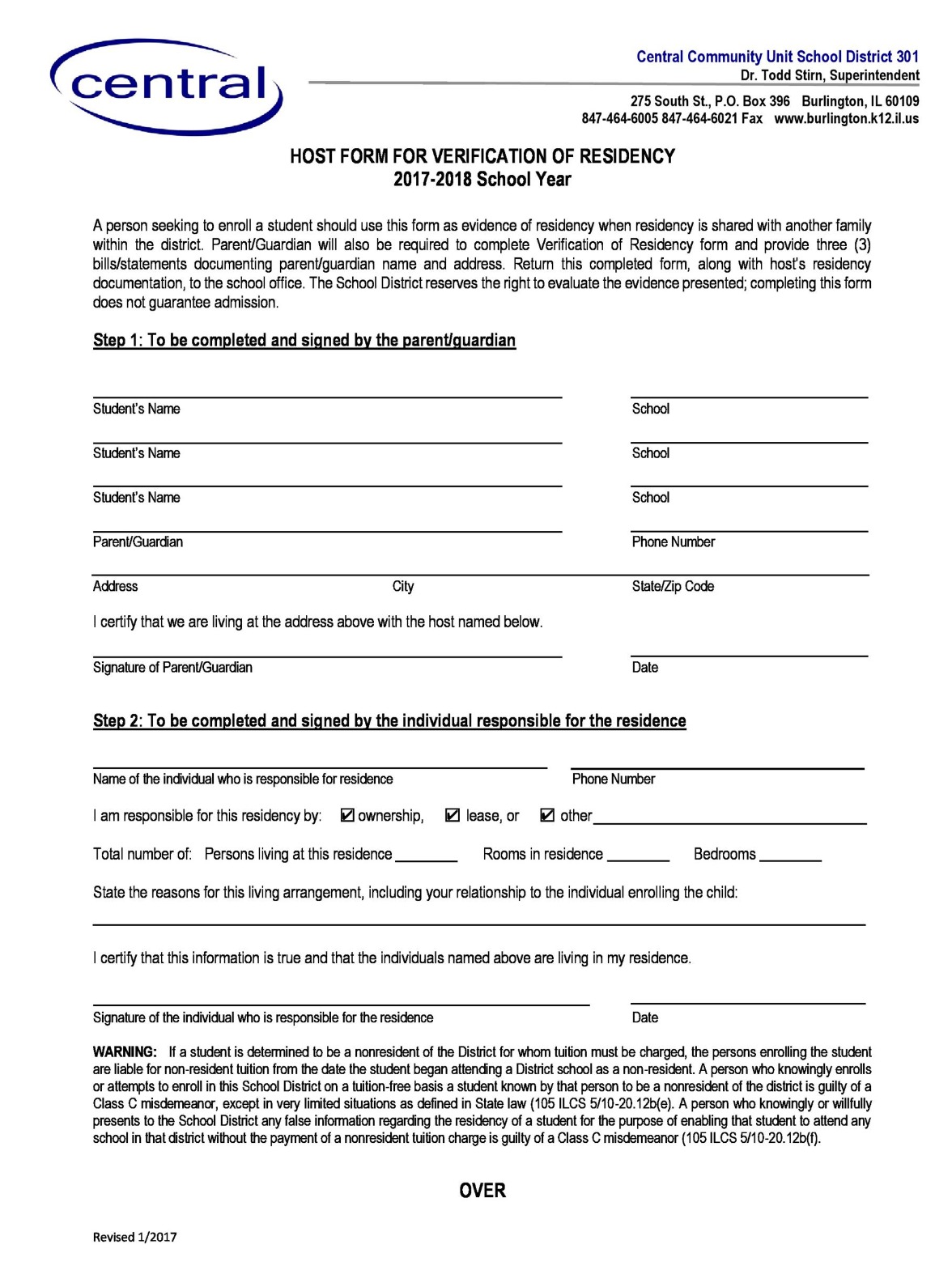
9. Sample Affidavit of Residence Procedure
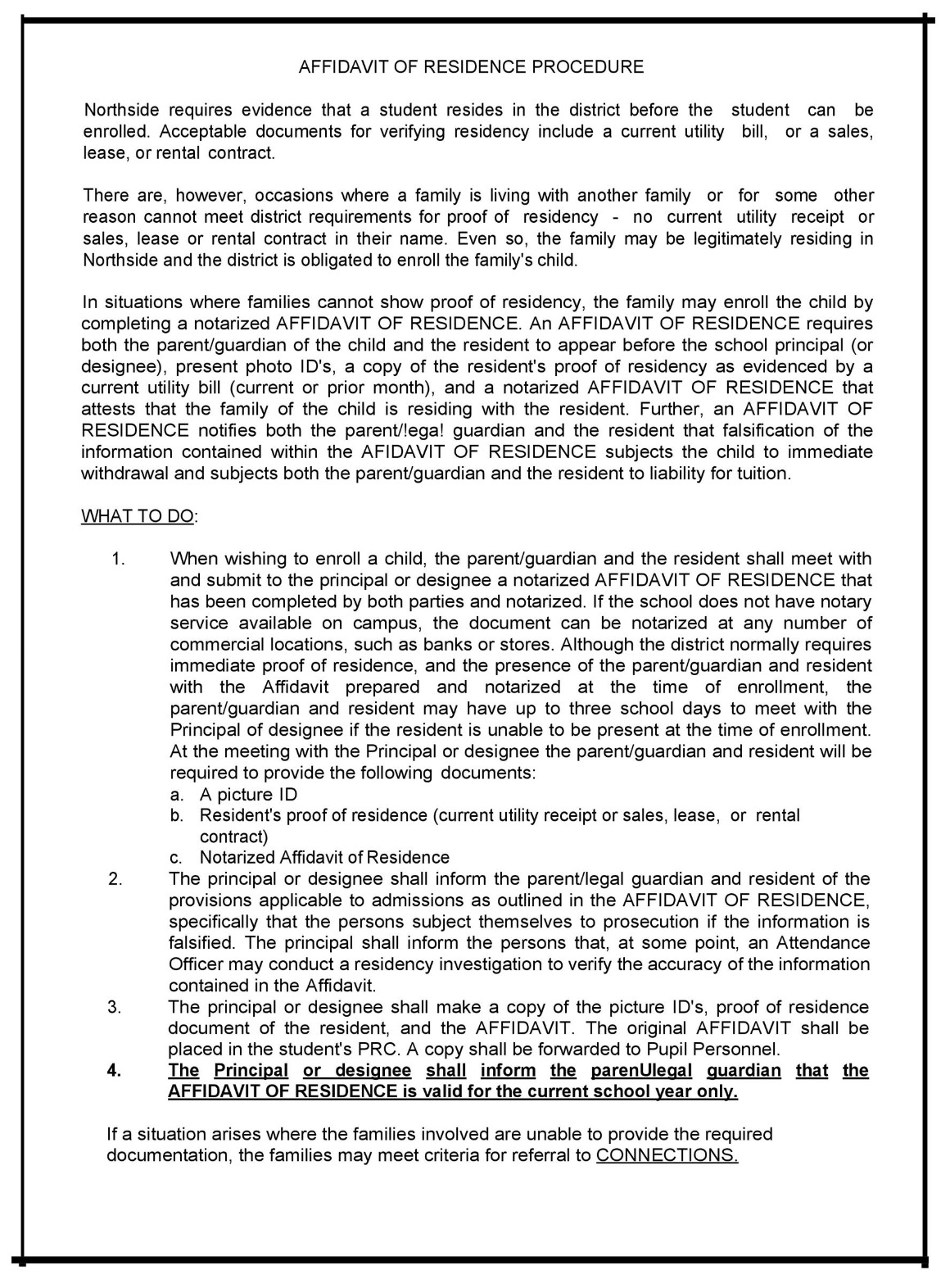
How to Write an Affidavit
An affidavit is a legal document used as evidence in various legal proceedings. It’s a written statement of facts that the affiant, the person writing the affidavit, swears to be true. Understanding its purpose is crucial for drafting an effective affidavit.
Identifying the Affidavit’s Specific Use
Affidavits have various applications, such as providing a witness statement, declaring financial status, or verifying a document’s authenticity. Identifying the specific purpose of the affidavit is essential in tailoring its content to the relevant legal context.
Gathering Essential Information
The first step in writing an affidavit is to gather all necessary information. This includes personal details like full name, address, and occupation, along with relevant dates, names, and specific details about the events or situations being attested.
Following a Structured Format
Affidavits typically follow a standard format:
Title: Indicate the purpose of the affidavit.
Identification: Start with the affiant’s personal information.
Body of the Affidavit: Organize the content into numbered paragraphs, each detailing a single fact or statement.
Statement of Truth: Conclude with a declaration that the information provided is true.
Signature and Date: End with the affiant’s signature and the date.
Notarization: A notary public must witness the signing of the affidavit, verifying the affiant’s identity and understanding of the document’s contents.
Presenting the Facts Clearly
The body of the affidavit should present facts in a clear, concise, and logical manner. Each paragraph should contain a specific point or detail, focusing solely on what the affiant knows personally and avoiding assumptions or opinions.
Using Plain and Formal Language
The language in an affidavit should be straightforward and formal. It’s important to communicate effectively while maintaining the professional tone of a legal document.
Reviewing Legal Requirements
Different jurisdictions may have specific requirements for affidavits, including unique wording, formatting, or additional elements like a jurat. It’s important to ensure that the affidavit complies with these local requirements.
Finalizing and Reviewing the Document
Once the affidavit is drafted, it should be reviewed for accuracy, completeness, and any grammatical or spelling errors. This step is crucial to ensure the document’s professionalism and credibility.
The Notarization Process
The final step is to have the affidavit notarized. This involves signing the document in front of a notary public, who verifies the identity of the affiant and confirms their understanding of the affidavit’s contents.
Conclusion: The Role of an Affidavit in Legal Proceedings
An affidavit is a powerful tool in legal proceedings, serving as a written testament to the facts it presents. Understanding how to properly compose an affidavit is key to its effectiveness in supporting legal arguments or claims.
10. Proof of Residency Letter Template
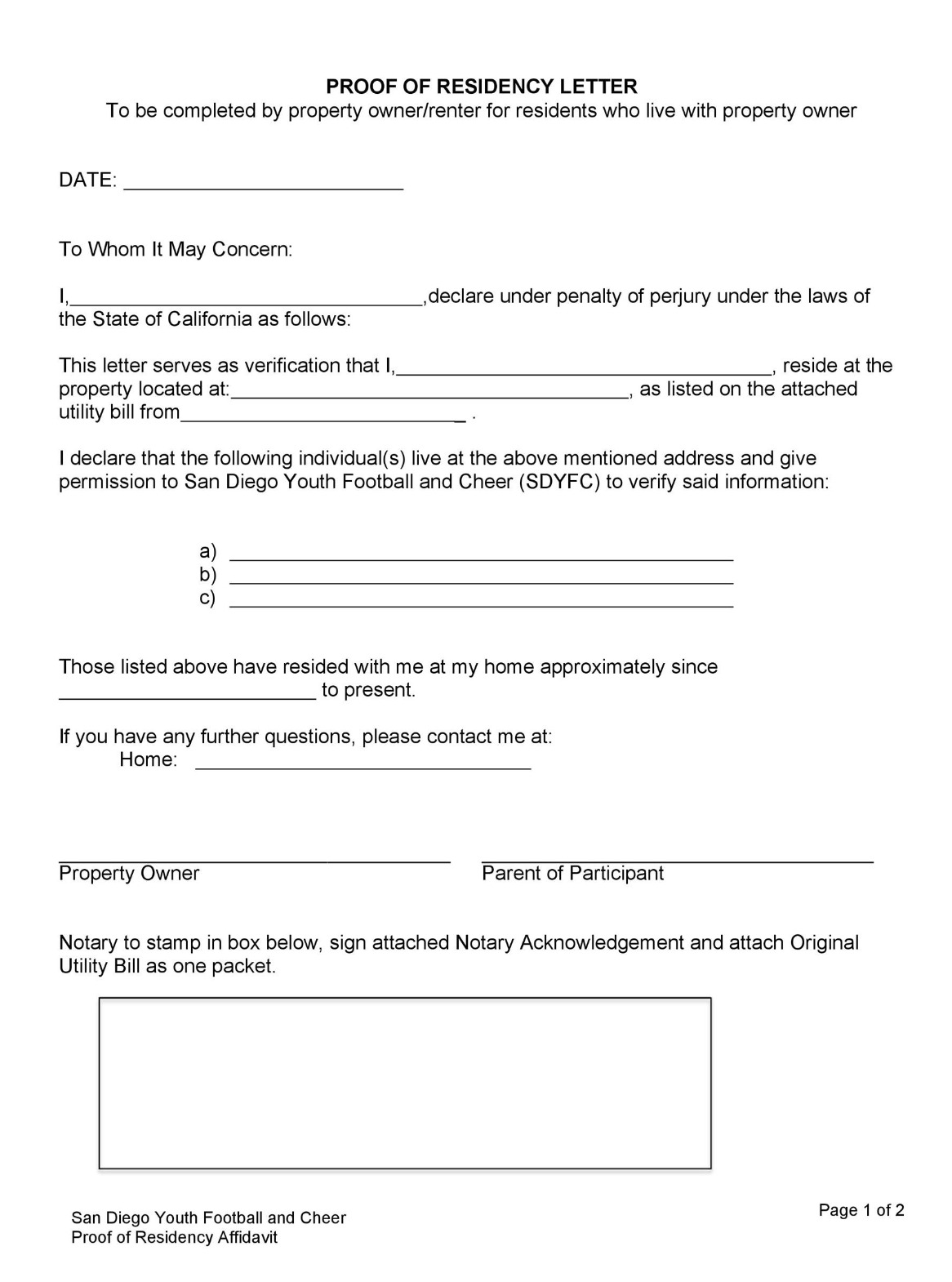
Related Posts
Letter of Intent Samples & Templates
Letter of Intent for a Job Samples & Templates
Lease Proposal Letter Samples & Templates
Letter of Inquiry Samples & Templates
Character Reference Letter Samples & Templates
Claims Letter Samples & Templates
Response Letter Sample & Templates
Follow Up Letter Samples & Templates
Sample Project Proposal Letter Templates
Donation Letter Samples & Templates
Addressing a Formal Letter Samples & Templates
Grievance Letter Samples & Templates
Sample Sponsor Thank You Letter Templates
Sample Letters of Request
Sample Cover Letter for Teacher
